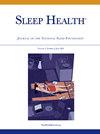Association of sleep timing, sleep duration, and sleep latency with metabolic syndrome in middle-aged adults in Korea: A cross-sectional and longitudinal study
IF 3.4
2区 医学
Q2 CLINICAL NEUROLOGY
引用次数: 0
Abstract
Objective
Sleep is a potential risk factor for metabolic syndrome. We investigated the associations of various sleep characteristics with the status and incidence of metabolic syndrome in middle-aged Koreans.
Methods
Using data from a community-based Korean Medicine Daejeon Citizen Cohort study on participants aged 30-50 years, cross-sectional (n = 1984) and longitudinal (n = 1216, median follow-up: 2.1 years) analyses were performed. To study the association of metabolic syndrome and five components with various sleep characteristics, measured using the Pittsburgh Sleep Quality Index, we used Poisson and logistic regression and Cox proportional hazard regression analyses, adjusting for covariates.
Results
Of 1984 participants, 66%, 19%, and 15% belonged to the non-metabolic syndrome, pre-metabolic syndrome, and metabolic syndrome groups, respectively. After covariate adjustments, the pre-metabolic syndrome group was associated with late mid-sleep time (≥5:00; prevalence ratios 1.61, 95% confidence interval 1.01-2.54) and late bedtime (≥2:00; prevalence ratios 1.55, 95% confidence interval 1.03-2.34), and the metabolic syndrome group was associated with long sleep latency (prevalence ratios 1.33, 95% confidence interval 1.03-1.73), poor sleep quality (prevalence ratios 1.38, 95% confidence interval 1.07-1.78), and early wake time (<6:00; prevalence ratios 1.29, 95% confidence interval 1.01-1.63). Longitudinal analysis of participants without metabolic syndrome at baseline indicated a significant increase in metabolic syndrome risk associated with very short sleep duration (<6 hours; hazard ratio 1.72, 95% confidence interval 1.06-2.79), long sleep latency (>30 minutes; hazard ratio 1.86, 95% confidence interval 1.1-3.12), and early wake time (<6:00 o’clock; hazard ratio 1.73, 95% confidence interval 1.01-2.97).
Conclusion
Sleep characteristics, such as short duration, long latency, and early wake time, were associated with an increased risk of metabolic syndrome in middle-aged adults.
韩国中年人的睡眠时间、睡眠持续时间和睡眠潜伏期与代谢综合征的关系:一项横断面和纵向研究。
目的:睡眠是代谢综合征的潜在风险因素:睡眠是代谢综合征的潜在风险因素。我们研究了韩国中年人的各种睡眠特征与代谢综合征的状态和发病率之间的关系:利用韩国医学大田市民队列社区研究的数据,对 30-50 岁的参与者进行了横断面(n = 1984)和纵断面(n = 1216,中位随访时间:2.1 年)分析。为了研究代谢综合征及其五个组成部分与使用匹兹堡睡眠质量指数测量的各种睡眠特征之间的关系,我们使用了泊松回归、逻辑回归和 Cox 比例危险回归分析,并对协变量进行了调整:在 1984 名参与者中,分别有 66%、19% 和 15%属于非代谢综合征组、代谢综合征前期组和代谢综合征组。经过协变量调整后,代谢综合征前期组与中晚睡眠时间(≥5:00;患病率比为 1.61,95% 置信区间为 1.01-2.54)和晚睡时间(≥2:00;患病率比为 1.55,95% 置信区间为 1.03-2.34)相关,代谢综合征中期组与中晚睡眠时间(≥5:00;患病率比为 1.61,95% 置信区间为 1.01-2.54)和晚睡时间(≥2:00;患病率比为 1.55,95% 置信区间为 1.03-2.34)相关。34),代谢综合征组则与睡眠潜伏期长(患病率比为 1.33,95% 置信区间为 1.03-1.73)、睡眠质量差(患病率比为 1.38,95% 置信区间为 1.07-1.78)和觉醒时间早(30 分钟;危险比为 1.86,95% 置信区间为 1.1-3.12)、觉醒时间早(结论:代谢综合征组与睡眠潜伏期长、睡眠质量差、觉醒时间早有关:睡眠时间短、潜伏期长和早醒时间长等睡眠特征与中年人患代谢综合征的风险增加有关。
本文章由计算机程序翻译,如有差异,请以英文原文为准。
求助全文
约1分钟内获得全文
求助全文
来源期刊

Sleep Health
CLINICAL NEUROLOGY-
CiteScore
6.30
自引率
9.80%
发文量
114
审稿时长
54 days
期刊介绍:
Sleep Health Journal of the National Sleep Foundation is a multidisciplinary journal that explores sleep''s role in population health and elucidates the social science perspective on sleep and health. Aligned with the National Sleep Foundation''s global authoritative, evidence-based voice for sleep health, the journal serves as the foremost publication for manuscripts that advance the sleep health of all members of society.The scope of the journal extends across diverse sleep-related fields, including anthropology, education, health services research, human development, international health, law, mental health, nursing, nutrition, psychology, public health, public policy, fatigue management, transportation, social work, and sociology. The journal welcomes original research articles, review articles, brief reports, special articles, letters to the editor, editorials, and commentaries.
 求助内容:
求助内容: 应助结果提醒方式:
应助结果提醒方式:


